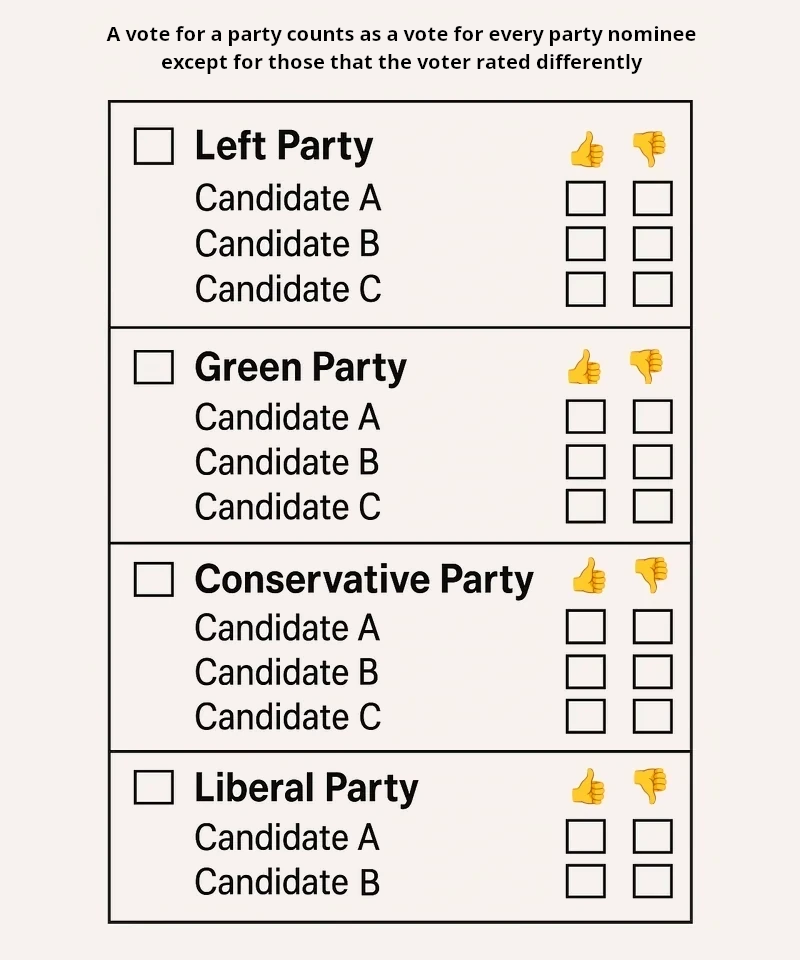Yes, for PR elections. Candidates from the voter's district could be optionally identified by name in bold font.
Posts made by Matija
-
RE: Alternative approval ballotsposted in Election Policy and Reform
-
Alternative approval ballotsposted in Election Policy and Reform

If the candidates are grouped by party and voters can vote for those groups then ballots can be filled out faster. -
RE: Phragmén-MMPposted in New Voting Methods and Variations
@toby-pereira I'm copying the non-awardment version of MMP, which is more proportional than others.
-
RE: Phragmén-MMPposted in New Voting Methods and Variations
@toby-pereira The first step is to guarantee every district a locally supported MP as long as they can agree on who should represent them.
-
Phragmén-MMPposted in New Voting Methods and Variations
Election takes place in a district cluster comprising 10 or more districts, each to be represented by 2 MPs. Each candidate runs in a single district but voters can vote for any candidates in the cluster.
In each district the candidate that got the largest number of votes from their own district is elected as long as that number is not smaller than Hare quota.
Candidates are elected step by step until each district has two MPs representing it. In each step the candidate with the most favorable ABC+A+B+C score among the candidates with less than 2 MPs already representing their district is elected. -
RE: How would public funding of political campaigns work with approval voting?posted in Campaign Finance Reform
@toby-pereira the problem I see with approval is that political parties could split to get more funding.
-
RE: Context of the Rise of the Third Reichposted in Political Theory
Two-round presidential election with 3 candidates in the second round is a factor I can think of.
-
How would public funding of political campaigns work with approval voting?posted in Campaign Finance Reform
With ranked voting it's easy - just take the top choice of every voter and use that for the amount of funding each candidates' party receives for the next election.
-
RE: Some political groups within Slovenia are pushing for MMP with runoff electionposted in Nation specific policy
The governing coalition opted for true open lists. Phragmén-MMP would be better because most of us like the idea of independent candidates.
Though open lists are still better than MMP with runoff. -
RE: Biproportional representation as a means to prevent bullet votingposted in Multi-winner
@lime I was talking about bullet voting with the goal of gaining a representative who lives nearby.
-
Biproportional representation as a means to prevent bullet votingposted in Multi-winner
I got an impression that in proportional approval voting, at least some voters might be incentivized to bullet vote for candidates who live nearby. Some level of biproportionality may remove this incentive.
-
Some political groups within Slovenia are pushing for MMP with runoff electionposted in Nation specific policy
I think it's clear why this would not produce proportional outcomes: with voting taking place on two separate ballots, there would be no way to balance out independents' seats. Some political parties could even exploit this flaw. Such a system would be worse than the current party lists system.
There will be a referendum on whether we should adopt that electoral system. -
RE: Good simple semi-PR methods?posted in Proportional Representation
@toby-pereira It's simpler to count and simpler to compute. ABC+A+B+C might be slightly more monotonic and is equivalent to using d'hondt formula.
-
RE: Good simple semi-PR methods?posted in Proportional Representation
A simple way to calculate sequential Ebert is to add for each already elected candidate, the number of voters who voted for both already elected candidate and considered candidate divided by number of voters who voted for already elected candidate. Then plug the sum into Sainte lague formula as number of party seats.
-
RE: Good simple semi-PR methods?posted in Proportional Representation
@anniek Sequential Ebert is precinct summable and fully proportional. It still has rounds but doesn't require counting ballots more than once. Might be what you're looking for.
-
RE: Vertical composition of multiwinner approval methodsposted in Multi-winner
@isocratia said in Vertical composition of multiwinner approval methods:
My basic use-case for this technique is when the first phase is simple bloc approval voting that filters out anyone with more than, say, 75% disapproval (this threshold is a parameter), and the second phase is some proportional approval voting method.
I would do the opposite: filter out anyone who would skew proportionality then apply a single winner method.